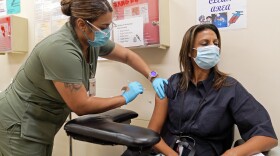-
Vaccines for a fall immunization drive against COVID-19 just got the green light from the Food and Drug Administration. The agency says the vaccines can protect people, as hospitalizations tick up.
-
While national data has long suggested that COVID-19 has affected low-income and minority groups at higher rates than others, this new research offers a hyperlocal view of pandemic disparities in Austin.
-
The federal emergency expires at the end of the day. Austin Public Health officials remind people COVID is still circulating and asks them to do what they can to prevent its spread.
-
The World Health Organization today lifted its Public Health Emergency of International Concern for COVID-19. That declaration went into effect three years ago on Jan. 30, 2020.
-
The bivalent vaccines offer protection against both the original strain of COVID and the omicron variants. The updated recommendations aim to simplify the vaccination schedule in the U.S.
-
Scientists at the university found antibodies that attack a key area of coronaviruses that isn't prone to mutation.
-
The local public health agency wants Austinites to get their vaccinations up to date before changes in federal policy potentially affect the availability of free shots.
-
Nurses often provide patients' most consistent face-to-face, hands-on care. But experts in the field are concerned about a loss of experience in the profession after pandemic fatigue and difficult working conditions caused many tenured nurses to leave the field.
-
Three years after Austin's first COVID case was detected, Lauren Ancel Meyers, director of UT Austin's Center for Pandemic Decision Science, says it's a matter of when, not if, another pandemic arrives. She and her fellow researchers want to be prepared.
-
The new approach would simplify vaccination guidance so that, every fall, people would get a new shot, updated to try to match whatever variant is dominant.
© 2026 KUT Public Media
A service of the Moody College of Communication at the University of Texas at Austin
webmaster@kutx.org
A service of the Moody College of Communication at the University of Texas at Austin
webmaster@kutx.org
Play Live Radio
Next Up:
0:00
0:00
Available On Air Stations










